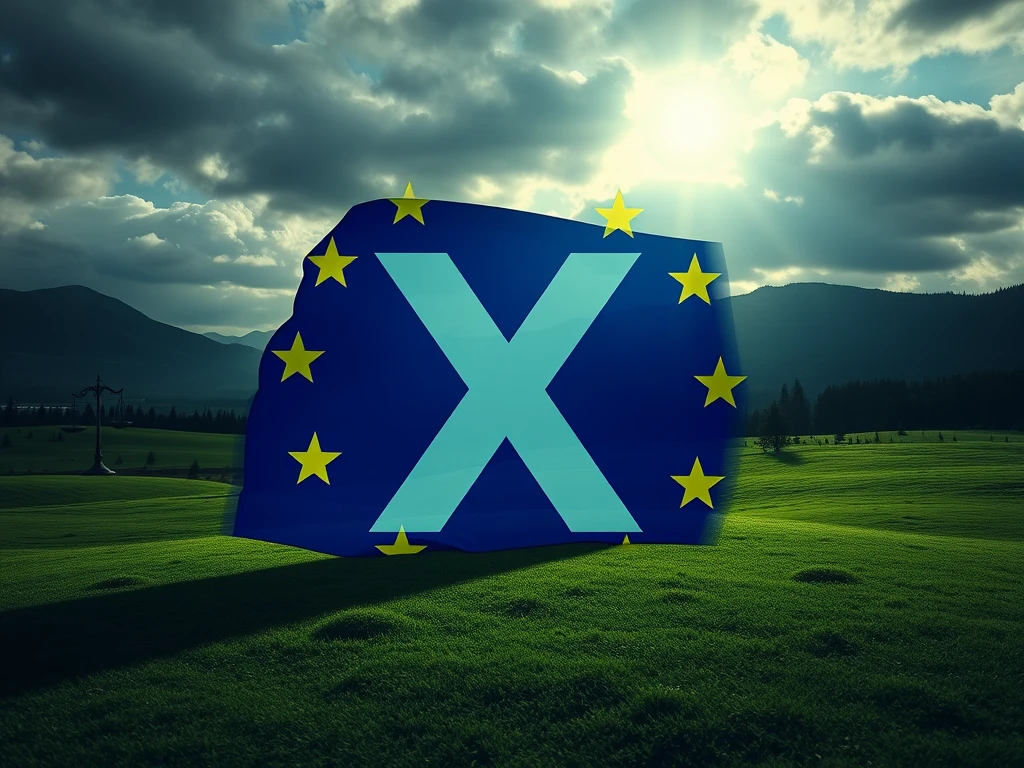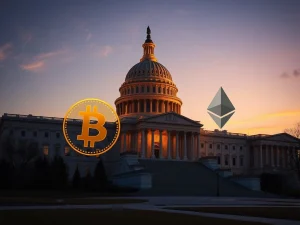Staggering $1 Billion EU Fine Looms Over Musk’s X: Censorship or Regulation?

A seismic tremor could be felt across the digital landscape as reports emerge suggesting the European Union is contemplating a staggering $1 billion fine against Elon Musk’s social media platform, X, formerly known as Twitter. This potential penalty isn’t just about pocket change; it’s a massive financial blow that factors in revenue from Musk’s other ventures like Tesla and SpaceX. The EU’s move is sending shockwaves through the tech world, raising critical questions about social media regulation and the future of online content moderation.
Why is the EU Eyeing a Massive Fine for Elon Musk’s X?
According to reports in The New York Times, citing sources with direct knowledge, EU regulators are accusing X of breaching the Digital Services Act (DSA). This landmark legislation, enacted in October 2022, aims to rein in the power of social media giants and clamp down on “illegal and harmful activities online.” The EU alleges that X has failed to adequately address illicit content and disinformation censorship on its platform, triggering this potential billion-dollar penalty.
Under the DSA, companies found in violation can face fines of up to 6% of their global revenue. What makes this case particularly noteworthy is the EU’s reported intention to calculate the fine based not just on X’s revenue, but also on the consolidated revenue of all companies under Elon Musk’s umbrella, including electric vehicle giant Tesla and space exploration pioneer SpaceX. This approach signals a potentially aggressive stance from EU regulators, aiming to exert maximum pressure on X to comply with its regulations.
An EU Commission spokesperson, while declining to comment on the specifics of this case, affirmed the EU’s commitment to enforcing its laws “fairly and without discrimination toward all companies operating in the EU.” This statement underscores the EU’s resolve to hold even the most influential tech platforms accountable to the DSA.
X’s Strong Rebuttal: Political Censorship or Legitimate Regulation?
X’s Global Government Affairs team has vehemently responded to the reports, characterizing the EU’s potential action as an “unprecedented act of political censorship and an attack on free speech.” In a strongly worded statement, X claims it has “gone above and beyond to comply with the EU’s Digital Services Act.” The platform vows to “use every option at our disposal to defend our business, keep our users safe, and protect freedom of speech in Europe.”
This clash highlights the fundamental tension between social media regulation and freedom of speech. X’s defense hinges on the argument that the EU’s actions are politically motivated and stifle free expression. Conversely, the EU is asserting its right to protect its citizens from harmful content and disinformation censorship online, arguing that platforms like X have a responsibility to ensure a safe digital environment.
Beyond the Billion-Dollar Fine: What Else Could Be in Store for X?
The potential $1 billion fine might just be the tip of the iceberg. Reports suggest that EU regulators could also demand significant product changes at X to bring the platform into compliance with the DSA. The exact nature of these changes remains undisclosed, but they could involve alterations to X’s content moderation policies, algorithms, or user verification processes. A settlement remains a possibility if X agrees to implement changes that satisfy the EU regulators.
Adding another layer of complexity, X is reportedly facing a second EU investigation. This separate probe focuses on allegations that X’s approach to policing user-generated content has transformed it into a breeding ground for illegal hate speech and disinformation censorship. This second investigation could lead to further penalties, compounding the pressure on Elon Musk X and its operations in Europe.
The Ongoing EU Investigation: A Timeline
The EU’s scrutiny of X is not a recent development. The investigation has been ongoing since 2023. A preliminary ruling in July 2024 already concluded that X had violated the Digital Services Act on multiple fronts:
- Refusal to provide data to external researchers.
- Lack of adequate transparency regarding advertisers.
- Insufficient verification of the authenticity of users with verified accounts.
Following this preliminary ruling, X reportedly responded with hundreds of points of dispute. Elon Musk X has been vocal about his disagreements with the EU’s approach. Musk even alleged that EU regulators offered him a “deal” – suggesting that if X secretly suppressed certain content, it could avoid fines. Thierry Breton, the former EU commissioner for internal market, refuted these claims, stating there was no secret deal and that X’s team had simply sought clarification on settlement procedures, which was provided according to standard regulatory practices.
What’s Next? A Public Legal Battle?
Musk has indicated his willingness to engage in a “very public battle in court” so that “the people of Europe can know the truth.” This sets the stage for a potentially protracted and high-stakes legal showdown between Elon Musk X and the European Union. The outcome of this dispute will not only impact X’s operations in Europe but could also have far-reaching implications for how social media platforms are regulated globally. The world is watching to see if this clash will result in stricter social media regulation or if it will embolden platforms to resist government oversight in the name of free speech.









